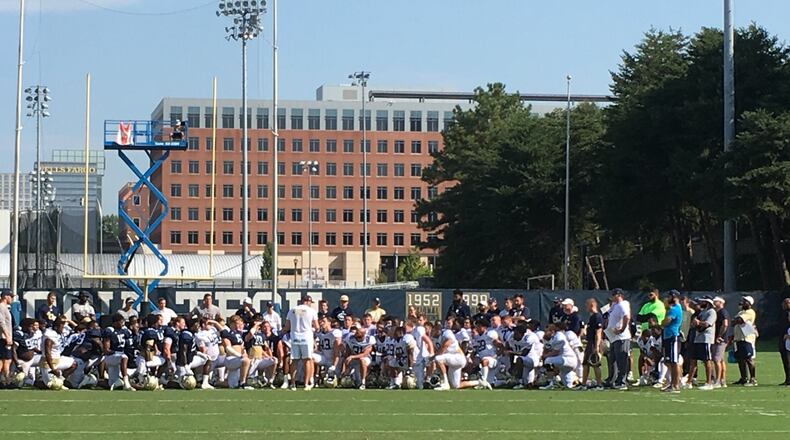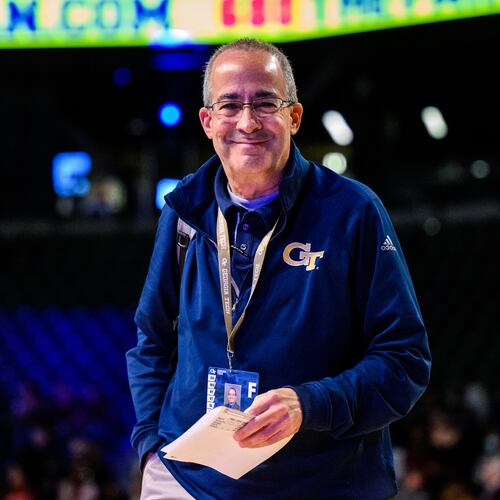Four days after a humbling defeat to The Citadel, there appeared to be no heads hanging low at Georgia Tech’s practice field Wednesday, unless you were to count quarterback Jordan Yates when he turned a cartwheel after he threw a touchdown pass.
Following only the second loss in school history to an FCS opponent, the Yellow Jackets clocked in for practice Tuesday and Wednesday with the energy and enthusiasm that coach Geoff Collins has aimed to foster.
“It was like we just got back here and started spring (practice) again,” safeties coach Nathan Burton said Wednesday. “Guys were just ready to move on and control what they can control.”
“Good energy, good tempo,” offensive-line coach Brent Key said Tuesday in an assessment of that morning’s practice.
There did not appear to be a hangover from the 27-24 overtime loss in the two practices, which were devoted to development and repetition, as opposed to specifically preparing for Temple, Tech’s opponent Sept. 28 after this week’s open date. The Jackets were to begin that work at Thursday’s practice, resuming Sunday.
Bringing a higher energy level was on Collins’ mind. On his radio show Monday, Collins had said that there were “lulls” in energy during the loss and that he had called in a number of players to show them clips of themselves from the game, focusing on their body language, even on the sidelines. During a break in Tuesday’s practice, those players were summoned to huddle with Collins. (It is customary for different groups of players to be called to Collins, typically before an 11-on-11 period.)
“We place a huge emphasis on our guys being great teammates,” Collins said on the show.
Two special-teams drills, one Tuesday and one Wednesday, gave an indicator of the team’s energy level and attitude. Tuesday’s was a punt cover/return drill. Players lined up across the line of scrimmage from each other, with four return-team members trying to hold up four punt teamers as the ball was released to the punt returner, who brought back the punt.
“Predator/Prey”, as the drill is called, was conducted at full speed, the one-on-one battles emblematic of Collins’ “competition is king” mantra.
The drill Wednesday was similar, except that it was for kickoff, with two sets of players lined up side by side, one covering and the other trying to set up the return. At the whistle, they raced, one sprinting to tag the returner, the other trying to shield him off.
There was little room for easing up, particularly as the entire team looked on as players cycled through the drills. As is Collins’ way, players were not merely watching. The offensive and defensive linemen, not participating in the drill, lined up across from each other on the hashmarks for the punt drill and along the numbers for the kickoff-return drill. They formed the boundaries for the drills.
Each group chanted in unison, the offensive linemen supporting the return team and the defensive linemen exhorting the coverage team. At different times, they slapped their thigh pads in time and did the wave, attempts to energize their teammates and add some levity to the drudgery of practice. On Wednesday, the offensive linemen sang the Tech fight song.
It wasn’t all levity. Players held others another accountable even for matters like properly doing disciplinary push-ups. But the mood was largely upbeat.
“I think as coaches, sometimes we’re the ones that bury our heads a little bit more than players at times,” said Key, who appeared to join in the rendition. “Kids are resilient, they come back from things. But at the same time, we understand we did lose a football game on Saturday, and it’s not OK to lose a football game.”
Collins himself appeared to be his same spirited self. He oversaw special-teams drills and worked with safeties, as usual. On Tuesday, he helped run a circuit of tackling drills for the defense. He ran the station for the tackle wheel, a ring made of foam and vinyl about four feet in diameter. With a swift kick, he sent the rings rolling at an angle towards the defenders for them to attack and tackle.
“Yeah, my man D.A.!” he shouted after safety Derrik Allen took his turn.
Running-backs coach Tashard Choice said that, as Collins had accepted blame for the loss, he did likewise with his running backs. He said it was a lesson he learned from his mother when he played youth football and complained about teammates after losses. His mother responded that he should have run for another touchdown.
“It was one of those deals where it was like, OK, you do more,” Choice said, emphasizing the “you.” “The kids, no matter how sad they are, I told them that it was my fault. But I wanted them all to (also) feel like it was their fault. So ultimately, it makes you work harder.”
The practices followed a day of self-scouting Monday by the coaching staff, poring over the first three games to pinpoint strengths and weaknesses both unit-wide and individually. Those insights were brought to the practice field, as well as a focus on avoiding the penalties that cost the Jackets against The Citadel.
The effort and mood of the Jackets’ first two practices don’t guarantee any results going forward, obviously. But they are a measure of the response to the first major on-field setback of Collins’ young tenure.
“It’s still so early in the football season,” defensive ends/outside linebackers coach Marco Coleman said. “There’s no need for us to get down. We’ve just got to keep moving.”
About the Author
Keep Reading
The Latest
Featured


